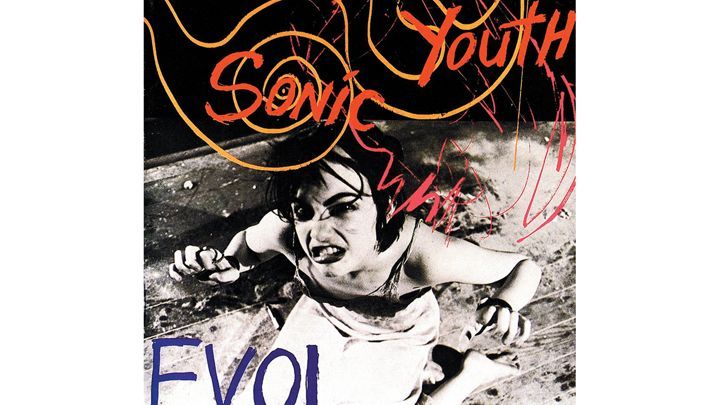Between 1978 and 1990 SST was the record label for American underground bands. The label was home to acts like Husker Du, Meat Puppets, The Minutemen, and Black Flag, whose guitarist Greg Ginn founded SST as a way to control release of his own band’s records. By 1986, after the death of D Boon and the subsequent disbandment of The Minutemen, and the untimely breakup of Black Flag, SST were looking to branch out. Enter Sonic Youth, with their third album Evol.
After drummer Bob Bert quit the band at the end of the Bad Moon Rising tour, Sonic Youth replaced him with the bespectacled Crucifucks drummer Steve Shelley. Shelley was housesitting for Sonic Youth’s Thurston Moore and Kim Gordon at the time, and was such a natural fit that they never bothered with an audition. Shelley’s hardcore background leant the band a structure and precision that coincided with their tentative first steps towards abandoning their ‘No Wave’ sound and a move towards a greater sense of melody.
Album opener ‘Tom Violence’ is a good example. Its dark, dream-like quality sets the tone for a record that looked at contemporary culture through a glass darkly. It has been noted before that America in the mid-1980s was a contradictory place. The conservative push for ‘law and order’ and its accompanying war on drugs was gaining purchase, isolating and infuriating the left wing. At the same time, mainstream American culture was resolutely cheerful and polished, with Kim Gordon noting the country’s “religion of optimism”. The artful chaos of Sonic Youth could not have been further removed from the status quo, as they picked away at the rotten heart of the cult of celebrity with songs like ‘Starpower’ and ‘Expressway to Yr Skull’. The latter boasts the alternate titles ‘Madonna, Sean, and Me’ and ‘The Crucifixion of Sean Penn’ in reference to the newly married couple whose relationship soon turned sour. ‘Expressway to Yr Skull’ opens with the lines “We’re gonna kill the California girls / We’re gonna fire the exploding load” and continues in the same disturbing vein, while infamously de-tuned guitars howl and screech. It’s almost like the sound of an air raid, like the world is crashing down around the band as they play.
This sense of impending doom seeps through the entire record. It’s in the panicky rise and fall of Gordon’s voice on the David Lynch-ian ‘Shadow of a Doubt’, and in the frenzied instrumental ‘Death to Our Friends’. It’s particularly pronounced on ‘Secret Girl’, which gives the sense of being trapped inside a vaguely murderous music box. As ominous, haunted-woods style samples give way to Gordon’s breathless vocal, you’d be forgiven for the odd prickle on the back of your neck. Likewise when listening to the staggering, twitchy ‘Marilyn Moore’, during which Thurston Moore wails “You’re always believing and believing in fear/Over and over”. It’s a fitting description for his audience, as Evol taps into the vein of fear and lets it bleed out.
The record’s creeping disquiet spins wildly into full-blown horror on ‘In the Kingdom #19’. If ‘Expressway to Yr Skull’ sounds like an air raid, then Lee Ranaldo’s vocal debut is the blitz. It tells the story of a highway accident in Ranaldo’s trademark drone, while feedback and traffic noises mingle in the background. The sharp series of small explosions during the middle of the song feed neatly into the violent narrative, but were actually the result of a fit of fun. During the recording of the vocal take, Thurston Moore burst into the booth and lit a string of firecrackers to shock his bandmate. It seems a typical Sonic Youth contradiction. They were the type of band who could present you with a stream of consciousness on murder and betrayal, totally straight-faced and a little frightening, and then suddenly catch your eye to let you see the sparkle there and the wry uptick at the corner of their mouths.
Overall, Evol was a snide strike back against an oppressive political environment and pervasive celebrity obsession. Thirty years on, a different generation of disenfranchised youth is ready to sneer at authority and creep out the conservatives. Evol would serve them just as it did Generation X – with raw unpolished vocals, and a screwdriver jammed under the fret-board.




